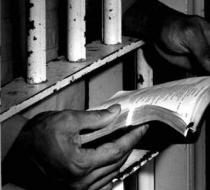Books for Prisoners Favorite
Many prisons have very small libraries with a limited selection of books. However, some prisons have nothing.
According to an organization called Books Through Bars, "access to books in prison varies from state to state, partly because nowhere is it legally mandated that prisoners have a right to educational or recreational reading material, including through general library services."
If prisons do allow books to be sent to their prisoners, every book must pass through the mail room security. Books are examined in content and in physical state. Many prisons only allow paperback books and will discard the book if any unknown residue is on it. Books will be banned if they contain vulgar, suggestive, or inappropriate images or words. However, according to a professor at the West Virginia University College of Law, Robert Bastress, "there is no evidence concluding that exposure to obscene material affects the morals or attitudes of prisoners."
Aside from profane or lewd books, many Best Sellers are even on the banned books list. Books containing works from James Patterson, Carl Hiaasen, John Updike, Janet Finch, and even art works from Michelangelo, Picasso and da Vinci, etc. are on the banned list and will not be delivered to the prisoners. (Dexheimer, Banned in Texas Prisons)
An organization called "Books Through Bars" sends packages of books from the shelves of their workplace to individual prisoners, rather than the prison library. They allow prisoners to write letters requesting books or genres of books. All books that are sent out and materials that are used are from donations. Volunteers at Books Through Bars work together to give prisoners access to decent educational and recreational reading material on the inside. The volunteers believe literacy and access to reading material is a human right. (http://booksthroughbarsnyc.org/about)
Without the ability to read and further educate themselves while completing their sentence, prisoners will take longer to work towards their job searches and degrees if they are looking to start or finish school. Studies show that prisoners who were able to have the opportunity to read books and educate themselves were less likely to be arrested and/or convicted again.







